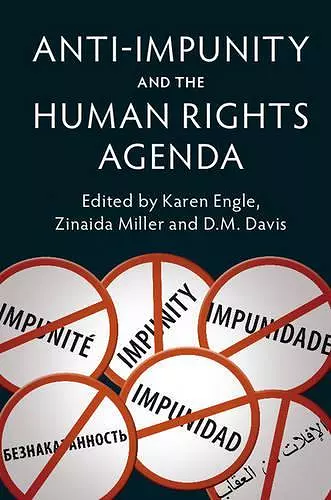Anti-Impunity and the Human Rights Agenda
D M Davis editor Karen Engle editor Zinaida Miller editor
Format:Paperback
Publisher:Cambridge University Press
Published:16th Dec '16
Currently unavailable, and unfortunately no date known when it will be back

This volume presents and critiques the distorted effects of the international human rights movement's focus on the fight against impunity.
Aimed at scholars, students, and practitioners of human rights and transitional justice, this volume presents and critiques the international human rights movement's focus on fighting impunity through criminalization in the twenty-first century. It considers the perspectives of multiple disciplines and takes into account a variety of institutional and geographical frameworks.In the twenty-first century, fighting impunity has become both the rallying cry and a metric of progress for human rights. The new emphasis on criminal prosecution represents a fundamental change in the positions and priorities of students and practitioners of human rights and transitional justice: it has become almost unquestionable common sense that criminal punishment is a legal, political, and pragmatic imperative for addressing human rights violations. This book challenges that common sense. It does so by documenting and critically analyzing the trend toward an anti-impunity norm in a variety of institutional and geographical contexts, with an eye toward the interaction between practices at the global and local levels. Together, the chapters demonstrate how this laser focus on anti-impunity has created blind spots in practice and in scholarship that result in a constricted response to human rights violations, a narrowed conception of justice, and an impoverished approach to peace.
'This is an exceptional edited volume. Whereas most edited volumes, unfortunately, do not go beyond collecting various perspectives on a theme, this book presents a clear argument: the anti-impunity turn in human rights law is not a linear development of progress and can have dangerous consequences. In setting forth these consequences, and analysing alternatives to the modus of criminal justice that the anti-impunity struggle has chosen as its preferred instrument, the book offers avenues towards richer and thicker conceptions and experiences of justice.' Sarah Nouwen, Co-Deputy Director of the Lauterpacht Centre for International Law, University of Cambridge
'This is the first sustained analysis of the 'anti-impunity' norm and discourse associated with the human rights movement. At the center of the project is the ambition to make the familiar strange and to expose taken-for-granted assumptions and identifications to critical scrutiny in a way that poses a powerful challenge to norms that frame contemporary international politics and interventions. … This book should be of great interest to a wide audience of scholars and policymakers. It articulates a direct rejoinder to what remains the dominant or conventional view among human rights scholars regarding the anti-impunity norm, while charting the path to a broader debate on the role of the human rights movement more generally.' Bronwyn Leebaw, University of California, Riverside
'An urgent question of political strategy drives this extraordinary collection: when should people of good heart embrace the national or international machinery of government, prosecution and punishment? And when should they resist, seek alternate paths to justice, speak truth to the power of the state or the international community? The human rights movement offers a half-century case study, shifting sharply from international calls for 'amnesty' when states abuse their penal authority to a full-bore embrace of criminal punishment and 'no impunity.' To figure out what happened, what worked and what didn't, the editors have curated a discussion among our most reflective and engaged scholars of international law, writing at their best. The result is challenging and surprising: crucial reading for anyone thinking strategically about ethics and global justice.' David Kennedy, Manley O. Hudson Professor of Law, Harvard Law School, Massachusetts
'Put simply, the turn to criminal repression of international human rights law is one of the most intriguing global legal developments of the last decades. Anti-Impunity and the Human Rights Agenda not only does a great job of showing how dominant a move this has become, it also spares no effort in showing how contested, ambiguous, productive, and paradoxical that move is. A welcome problematization of what has become one of the great obsessions of our times.' Frédéric Mégret, McGill University, Montréal
'They conclude that a laser focus on anti-impunity has created blind spots in both practice and scholarship that result in a constricted response to human rights violations, a narrowed conception of justice, and an impoverished approach to peace.' Law and Social Inquiry
ISBN: 9781107439221
Dimensions: 227mm x 151mm x 20mm
Weight: 560g
398 pages